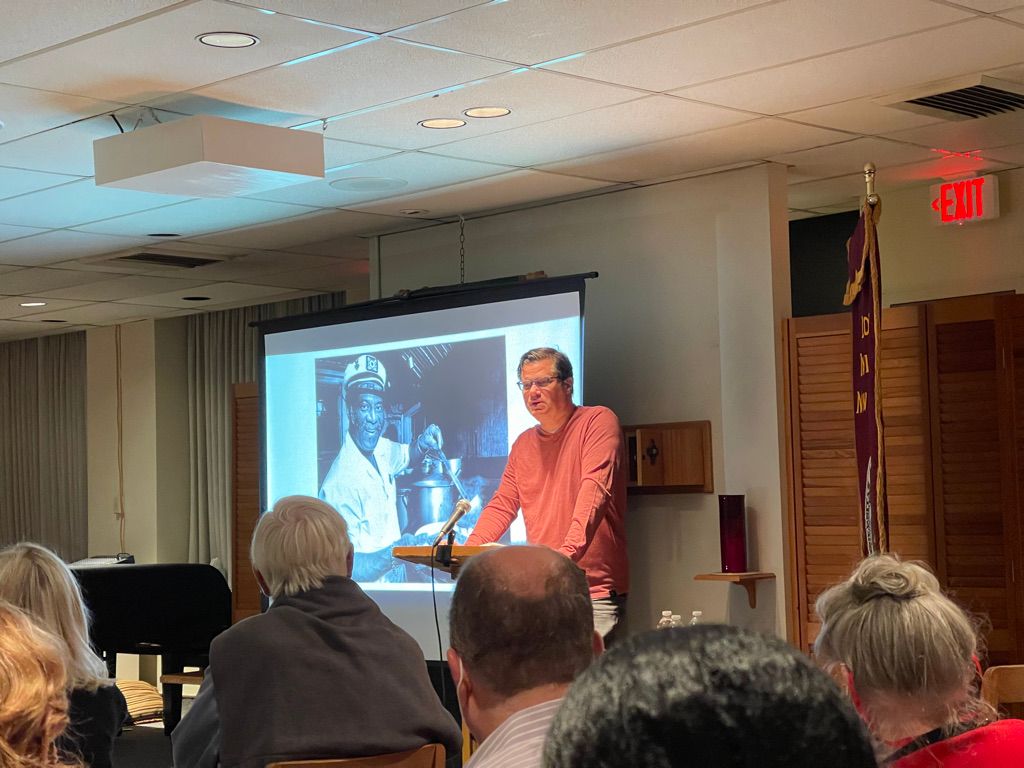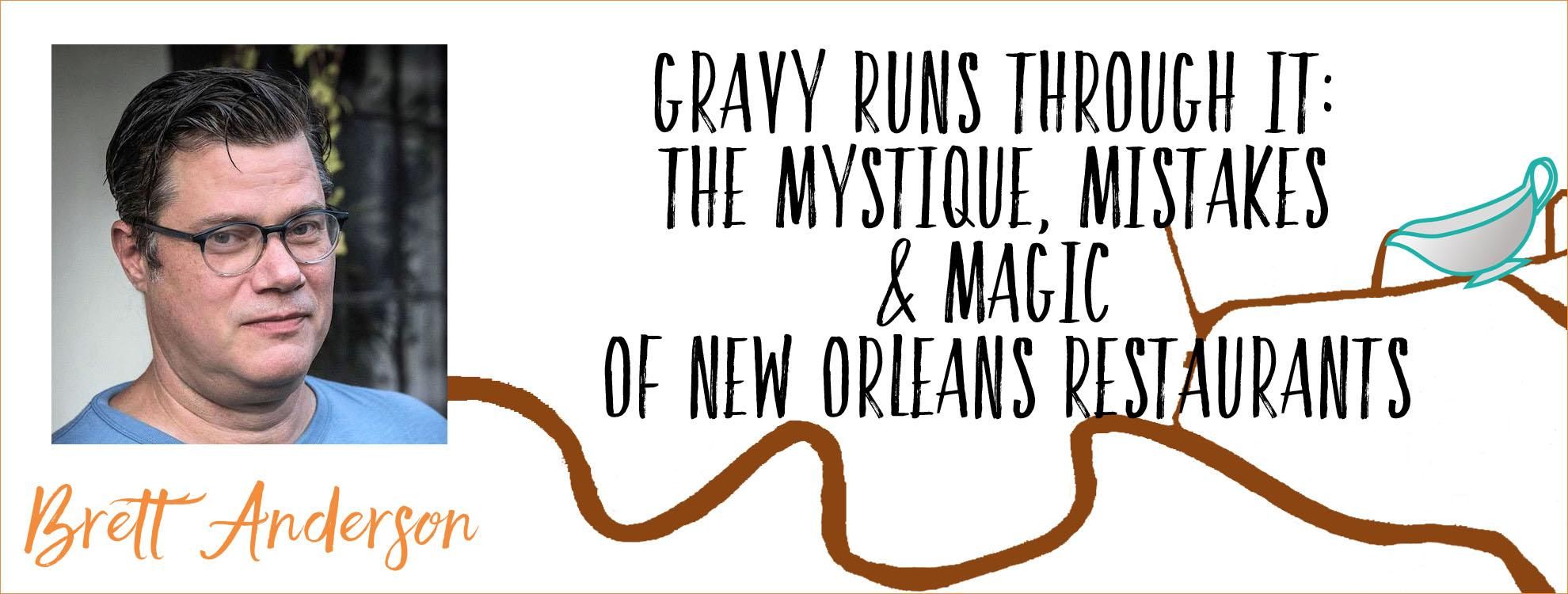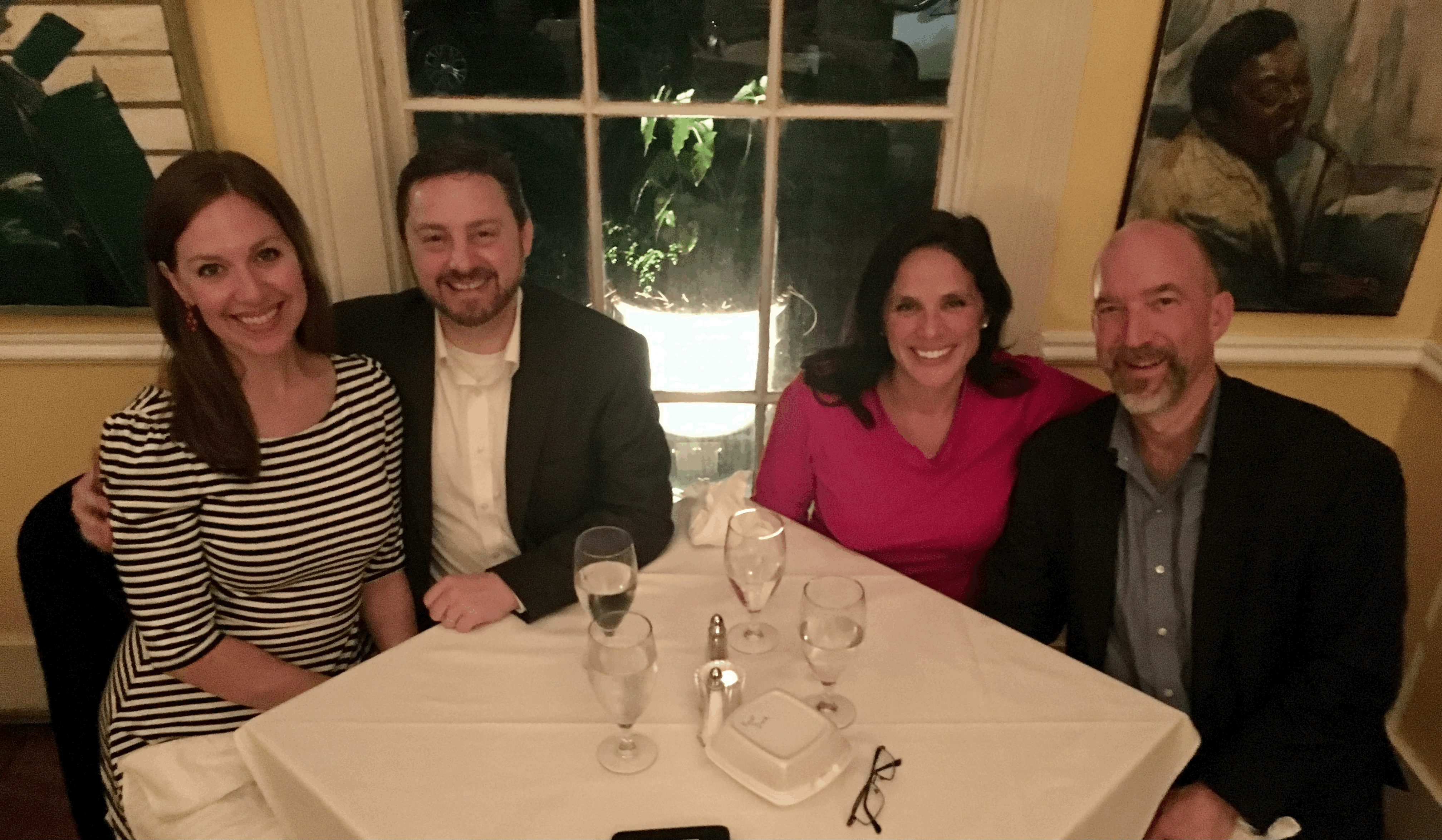Gravy Runs Through It: Brett Anderson’s New Orleans

On Tuesday night, New Orleans journalist Brett Anderson presented the fall lecture for the College of Nursing and Health at Loyola University New Orleans. The college has a new tagline – Health in Mind, Body, and Spirit – and they invited New York Times food correspondent Brett Anderson to help reflect on the implications of the tagline, specifically on the complexities of restaurants and food, what they might say about human wholeness, and what social justice implications he might draw from his work.
Though originally from Minnesota, Brett Anderson made New Orleans his home over 20 years ago, and he has since established himself as an authoritative journalist in the restaurant and food industry of the city.
Here’s his bio from the College’s event page:
Brett Anderson is a food correspondent for The New York Times. He joined the Times in 2019 after serving as restaurant critic and features writer for The Times-Picayune in New Orleans for nearly 20 years. He has won three James Beard Awards, including the Jonathan Gold Local Voice Award, and was a member of the Picayune staff awarded a Pulitzer Prize for Public Service for its coverage of Hurricane Katrina. He was a Nieman Fellow at Harvard University in 2013, and his groundbreaking reporting on sexual harassment in the restaurant industry has garnered numerous accolades, including being named Eater’s Reporter of the Year in 2017. He was on the team awarded the Scripps Howard Edward J. Meeman Award for environmental reporting for his work covering the BP oil spill in 2010, and he received the Excellence in Journalism Award from the Renewable Natural Resources Foundation for “Louisiana Loses Its Boot,” a longform story about the state’s disappearing coastline. His work has appeared in newyorker.com, Travel & Leisure, Oxford American, Gourmet and the Washington Post; and his stories have appeared in eight editions of the anthologies Best Food Writing and in six of Cornbread Nation. He began his career writing about music, among other topics, for alternative weekly newspapers in Minneapolis and Washington, DC, both edited by his mentor, David Carr.

Mr. Anderson’s lecture was entitled “Gravy Runs through It: The Mystique, Mistakes & Magic of New Orleans Restaurants,” and I found it fascinating on many fronts. I can’t share all of what I would like to share today, but I will give you a little taste.
But first, I have tell you a little backstory. It tickles me how things tie together in life, often things that, on the surface, don’t seem to go together. In this case, I’m referring to biblical theology and the restaurant industry.
A little over a week ago, as we prepared to celebrate the 32nd Sunday in Ordinary Time, I watched a reflection by Dr. Brant Pitre on the gospel reading for that Sunday: Mark 12:38-44. It’s the story of The Widow’s Mite, but Jesus prefaces that story with an indictment against the scribes, saying that they “devour widows' houses and for a pretense make long prayers.” As Dr. Pitre commented on this passage, he explained how the scribes were seen at that time, and almost as an aside, he said, “So what [Jesus is] doing here is he's taking basically some of the most wealthy and elite members of Jewish society, who back then actually, unlike in our society where we idolize musicians or sports stars, athletes and that kind of thing, because that’s what we value, we value entertainment. In First Century Judaism, because they valued the Torah, they valued the law, they valued worship, they valued their religion, then the scribe, believe it or not, scholars, were highly revered figures within Jewish society, right. They were among the elite, they were revered.”
What caught my ear, and what I kept going back to… for over a week, was this part: “…unlike in our society where we idolize musicians or sports stars, athletes and that kind of thing, because that’s what we value, we value entertainment.”
Ouch.
But that is so true. Look at where our money goes. It goes toward what we value. And after food and shelter, it looks like the bulk of our money (at least in the West) goes to entertainment in some form or another.
Now, back to Tuesday night and Mr. Anderson’s insightful lecture. He framed his remarks within segments of his journalism career in New Orleans… stretches of time and the major events that occurred therein. 9/11. Pre-Katrina, post-Katrina. Pre-social media, and post. Pre-#MeToo, and post. Lots of stories. Lots of significance. He ended with the current COVID era and one particularly personal news story that, really, unfolded right there in that room. But I’ll save that till the end.
Within the framework of his remarks, he brought up a number of social justice issues at play in the restaurant industry: abusive managers, racial and sexual harassment, and the economic disparity between the “front of the house” and the “back of the house” – which simply refers to how restaurant work is typically segregated, with wait staff and hosts/hostesses in the front of the house and kitchen and clean up in the back of the house. Waiters and waitresses have the opportunity to earn much more through tips than do cooks and dish washers who are hourly employees.
But the issue that jumped out to me the most had to do with the culture of celebrity chefs and the abuse that typically follows in its wake. The dynamic of “celebrity chefdom” extends farther than one would think on the surface. Not only can a celebrity mistreat those who are “below” him or her, but even among the “lower class,” the employees, there can be a reluctance to report abuse because the whole structure, and all of the employees, are riding on the coattails of the talented one, the celebrity. To report an abusive celebrity would, therefore, negatively impact one’s fellow employees and, presumably, friends.
Still, given all the injustice that happens in restaurants, the fact is, Mr. Anderson noted, that we will still eat out. Dining out, after all, has become entertainment.
There’s that word again. Two disparate things connect right here in that word… entertainment. And, the sad truth is that it’s our disordered valuation of entertainment that brings about – that allows to happen – the abuse that scandalizes us. Here, I think, is where we would really find the answer to the question regarding the College’s new tagline and its implications… regarding the complexities of restaurants and food, and what they might say about human wholeness. The casual diner cannot be exonerated in this question of social justice, especially in a culture where he – you, me – prizes entertainment above all else.
A miserable night this would have made, if Mr. Anderson had stopped there. But, he had more for us. A modest solution. A way of finding humanity in all of this… our own, and that of those who work in restaurants.
Toward the end of his lecture, Mr. Anderson spoke of JoAnn Clevenger and her iconic Upperline restaurant. Ms. Clevenger happened to be seated Tuesday night about 5 feet in front of me. Mr. Anderson concluded his lecture with her story, noting that he had just submitted his article about the closing of Upperline an hour before the lecture began. That article, incidentally, was published yesterday in the New York Times. I humbly recommend it to you. Mr. Anderson includes details about Upperline, about Ms. Clevenger, that will certainly inspire you.

Upperline has graced New Orleans for nearly 40 years. JoAnn Clevenger was no chef. And she was no celebrity. At least not in the way that Emeril and Prudhomme and Besh were. She was simply the hostess. But, as it turns out, being the hostess was everything. She shared with Mr. Anderson, and he with us, the concept that she held of the “benevolent circle.” Anderson writes, “She explained what attracted her to hospitality when she worked on Bourbon Street in the 1960s and ‘70s. ‘I remembered things about the customers and the bartenders and the other people that worked on the street,’ she said. ‘And they loved that, and that made me feel good that I made them feel good. It’s a benevolent circle.’” Again, there are stories in that article that you need to read. Read it.
COVID has taken a toll on all of us. And, in a way, it might seem insensitive to be saddened by a business closing due to it. After all, so many people have lost so much more… family, friends. And yet, Upperline, and its 82 year old hostess, was a ray of sunshine in the city of New Orleans. It not only touched the lives of countless people, but Ms. Clevenger and her benevolent circle potentially helped those countless people to touch countless more.
In the end, as Mr. Anderson adequately noted, the only thing – the best thing – we can do to counter the social injustice we encounter is to meet it with curiosity and human connection. Be curious, he urged us. Talk to your waiter or waitress. Ask them if they like the restaurant, if they like working there. Get to know them. Be human.